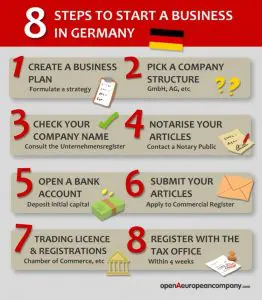Table of Contents
Are you considering starting a business in Germany? If so, you’re at the right place! Starting a company can seem overwhelming, especially when navigating foreign markets. Here, we will provide an easy-to-use guide with all the essential information and advice you need to launch your venture successfully.
We’ll cover topics such as setting up a company, registering with German authorities, finding investors, choosing real estate options, hiring talent and more. Whether you’re looking for help on how to start a new business or just want to brush up on German regulations, this post has everything you need.
You might be interested in how to expand your business to Germany
How Difficult is it To Start a Company in Germany?
Starting a company in Germany is no small feat, as the process involves bureaucratic and financial hurdles. To register a business, prospective founders must have a valid banking account, acquire “Trade/Service Licenses” from the local authorities, apply for social security numbers, open tax files and take out employee liability insurance.
Moreover, there are limitations on which sector of the economy a German company can operate in due to restrictions imposed by the government. For example, many service businesses need legal authorization from the local trade office. All these regulations and paperwork can be overwhelming for many founders and future entrepreneurs, especially those with limited knowledge about financial rules in Germany.
Bottom line – starting a company in Germany is not quick or easy, but it can be done if you adhere strictly to all rules and regulations established by the government and there are many benefits when you start a business in Germany.
Tools That Can Make it Easier
Business Registration
Starting a business in Germany can be daunting, but it can be made much easier with the right tools. One invaluable tool for any entrepreneur looking to do so is registering their business with the registrar. Not only does this provide front-end assurances of legal compliance, but such an institution must also help companies to stay onside with local laws and regulations throughout their operations.
With the assistance of a registrar, companies can avoid costly fines due to missteps and oversights and build reliable plans around taxation and reporting. Furthermore, by employing the services of a registrar, entrepreneurs gain access to experts that can provide additional assistance in attaining loans and open communication channels when dealing with other government institutions.
All these benefits make registering a company with a registrar an essential tool for anyone preparing to start a new venture in Germany.
Accounting
Starting a company in Germany can seem daunting, but some helpful tools are available that make the process much easier. One of the most valuable tools is your tax advisor, who can do your accounting. They can provide personalized advice on managing your financials best and keeping you organized amidst all the paperwork and deadlines.
What’s more, having an experienced tax advisor is beneficial when it comes time to file your returns –they know all of the ins and outs of German corporate tax laws, avoiding potential pitfalls and helping you to maximize deductions that you may not even know exist.
The peace of mind that comes with guidance from a professional makes having a tax advisor invaluable as you launch your business in Germany.
Speaking German
One of the essential tools a new business owner in Germany can have is a tax advisor. The tax code in Germany can be complex and intimidating, making it necessary to have an expert who knows the requirements and regulations. A great perk of having a tax advisor is that they can talk with the Finanzamt for you.
This allows you to focus on other business launching aspects, such as choosing inventory or hiring employees. It also means that you won’t waste time figuring out which documents must be filled out or when your taxes are due. With the help of an experienced tax advisor, starting a company in Germany can go far more smoothly than if you tried to manage all of these responsibilities alone.
Steps to Starting a Company in Germany
Register Your Address
The first step to starting a company in Germany is ensuring you have a definitive address. Without registering your designated address, no other steps can be taken to founding a business in the country. This location should not only have some permanence but also be able to take on any mail associated with the company.
Additionally, having an already established bonafide place of residence will help in filing all the necessary paperwork, such as registering taxes, hiring employees and obtaining permits from authorities. With these critical elements in place, entrepreneurs can look forward to creating their companies in Germany – one step at a time!
Set Up a Bank Account
The second step in starting a company in Germany is perhaps the most important: setting up a bank account. A business must have such an account to make payments, receive income and generally manage its finances. It is relatively easy to open a bank account for a company; applying for one requires the necessary set of documents, including proof of identity and documentation proving the setting up of the new business.
The local credit institution’s acceptance decision for opening an account must be received before continuing with other steps required in registering the company. Furthermore, note that some forms of credit cards are unique to certain banks and may only be obtainable through a specific institution.
Comprehensive research applicable to one’s situation can result in better decisions regarding business accounts.
Find a Tax Advisor
The third step in starting a company in Germany is finding a tax advisor. Though starting a business can feel intimidating and complicated, the expertise of a professional can help ensure that you are well-informed and ready to tackle any tax-related issues or other concerns.
It helps to review prospective advisors’ online profiles and reviews before setting up an appointment, as well as asking for referrals or references. When selecting a tax advisor, it can be helpful to think about their experience in similar businesses or confirm if they have specialized knowledge on accountancy, finance, international taxation, or mergers & acquisitions.
Researching your options in advance can go a long way towards setting up your business efficiently and confidently.
Gewerbe or Freiberufler
At the fourth step of starting a company in Germany, you must decide between Gewerbe or Freiberufler. If your business involves trading goods or services, such as a restaurant, cafe or retail shop, you’ll need to register with the Trade Office and be classified as a Gewerbe. This requires additional compliance paperwork and fees, as well as invoicing requirements.
On the other hand, if you’re planning on doing interior design consulting, medical practice or accounting, for example, you should register as Freiberufler. This classification allows for more freedom regarding taxation and does not require additional approvals from government agencies. Either way, ensure your business is correctly registered before getting started on its journey in Germany.
Getting a Trade License
The fifth step in setting up a business in Germany is getting a trade license. This official document authorizes individuals or companies to make a living from a particular profession or to conduct individual transactions. This trade license can only be issued in the local city office; it must comply with German law, and having one is legally required under German commercial law.
An application for the trade license must include an estimated starting date and details about the position and any employees. To successfully apply for a trade license, you must prove that anyone working for the company meets German regulations and legal requirements such as insurance coverage and tax liabilities. Getting a successfully traded license is essential for conducting work in Germany.
Registering With Finanzamt
The sixth step for successfully starting a company in Germany is registering with their Finanzamt, or tax office. This is essential, as the tax office will issue a tax identification number you must use when filing taxes and invoicing your customers.
During registration, proof of the company’s address must be provided, as its articles of incorporation and other registration documents prove the company is officially formed in Germany. It’s important to note that all documents must be submitted in German, so hiring a professional who can facilitate the language translations is highly recommended.
With this process completed, you are officially registered with the German government and can now focus on making investments and bringing in revenues for your business.
Getting a Residence Permit
Completing the seventh step of starting a company in Germany—obtaining a residence permit—can be daunting for immigrants. Remaining in the country legally may not be feasible without a residence permit. To acquire one, you must apply for a visa and present it at the immigration office closest to where you live.
To increase your chances of success during this process, make sure all your documents are up-to-date and organized. Additionally, ensure all paperwork is filled out accurately and completely before submitting.
Be prepared to wait several weeks or months while your application is processed. However, with patience, perseverance, and the same paperwork in place, you should eventually have your residence permit to continue your entrepreneurial endeavours in Germany.
Insure Yourself and Your Company
Another essential step to starting a company in Germany is ensuring yourself and your company. This will protect you, your business and any employees from financial loss if anything should happen that disrupts operations. If a natural disaster, for example, were to occur, having insurance can help ease the financial burden placed on you or your staff.
Additionally, failing to insure yourself properly or your company may lead to financial penalties by the government. Therefore, it is imperative that you thoroughly research different types of coverage available so you can find the one most suitable for your business. This step helps ensure you remain compliant and secure in the long run.
Read more about starting a business in Germany in 8 steps (with infographic) and starting an e-commerce business in Germany
Want To Start a Company In Germany?
These are the basics of setting up a company in Germany. As you can see, it’s not too complicated, but there are a few things to keep in mind. However, if you need help or have questions at any point, don’t hesitate to contact OpenAEuropeanCompany. We would be happy to assist you further and answer any questions about opening a branch or subsidiary in Germany and also multi countries company formation.







